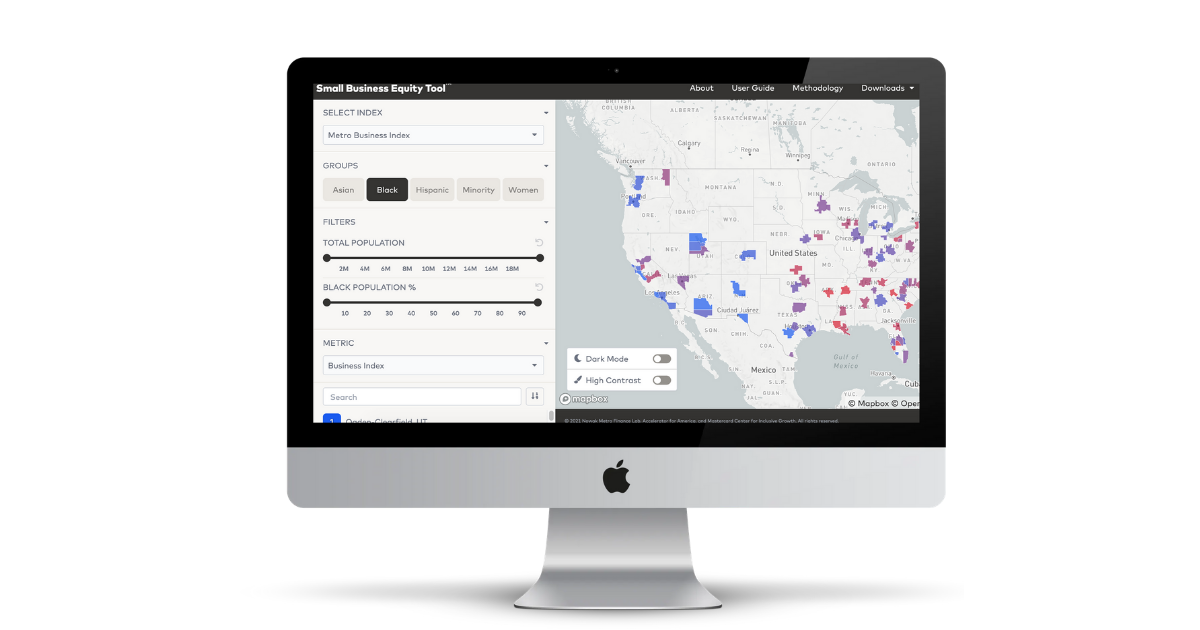National Inclusive Metro Recovery Playbook
In partnership with Accelerator for America and MasterCard Center for Inclusive Growth
March 18, 2021

View Our Small Business Equity Tool
The State of Small Business in America
The COVID-19 crisis is our nation's greatest economic shock since the Great Depression. It is landing hardest on small businesses, the heart of local economies, and community life. The pandemic has reminded us of the outsized role small businesses play in our economy, employing 47% of the U.S. workforce, generating two-thirds of new jobs, and serving as a critical path to economic self-sufficiency. The pandemic has revealed not only the fragility of many of these enterprises but also the profound deficiencies in how they are supported by federal policies, private practice, and local action.
The COVID-19 crisis has devastated Main Street small businesses across America. Since February 2020, almost a quarter of all U.S. small businesses have closed at least temporarily. In the hardest-hit sectors, like restaurants, hotels, and retail, the numbers are far higher. In September 2020, Yelp reported that for businesses on its platform, more than half (60%) of closures were permanent. Womply has estimated that 185,000 small businesses — one in seven nationally — had shut down permanently by the end of August 2020. Those closures have left millions of Americans out of work and transformed lively neighborhoods around the country into retail ghost towns, destroying the wealth built by many families over generations in the process.
The Impacts for Black Business Owners Have Been Catastrophic.
Because Black-owned businesses tend to be smaller, operate with less capital, and have less-established banking relationships than their white-owned counterparts, they are also more likely to fold under economic pressure. The Federal Reserve of New York reported that from February to April of 2020, the number of active Black businesses declined by 41 percent. Due to well-documented issues in the distribution of federally backed forgivable loans to Black business owners through the Paycheck Protection Program in the spring, Black business closures are likely higher than this early number reports. This is a devastating setback for metro economies, the quality of life in neighborhoods around the country, and for efforts to close our nation's growing racial wealth gap.
America's Black-owned businesses entered the coronavirus pandemic in a much weaker spot than the country's white-owned businesses. We document the baseline for Black-owned firms in the 100 largest metros and cities in America in 2017, the most recent year for which federal data is available, in our Small Business Equity Tool. Put bluntly, the picture is not pretty. In 45 years, America has managed to create 100,000 new Black-owned businesses with employees. During that time period, we have added 3.7 million employer businesses overall. Our policies have fallen short because our vision has fallen short. We have not properly understood the disparities and have focused on the wrong indicators of success. We built the Small Business Equity Tool so local leaders could understand their local baseline for the number, size, and sector concentrations of Black-owned businesses and the significant gaps that exist between Black- and white-owned businesses. This will allow them to set ambitious goals for an inclusive economy.
Ambitious goals are necessary for this moment in our nation's history. They show the massive opportunity to simultaneously grow our economy, transform our cities, and close our wealth gap. Doing so requires more focused goals, more intentional coordination, and a more tenacious commitment than ever before. We are hopeful. President Biden has made racial equity a central commitment of his executive actions and plans to build back better from the pandemic. But federal action must be met by local ingenuity. This document provides a metro-level playbook for mayors, business leaders, civic inclusive recovery. It provides a snapshot of where we were as a country prior to the pandemic, measures the tremendous economic opportunity of an inclusive emerging to create an ecosystem approach. In sum, it provides a clear set of actions to drive the inclusive recovery our cities need.